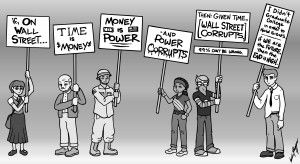
In September of 2008, the economy crashed. Since then, little has been done about it. Recently, this has gotten some people quite angry. The phenomenon known as “Occupy Wall Street” (or wherever else) has swept not only our nation, but also others around the world. The Washington Post puts the number at over 900 protests globally, including over 70 major U.S. cities. The problem is that nobody knows what that means. Columnists and commentators have been trying to pin down #OWS for the last month or so, never with much success. One thing is for certain: There appears to be a lot of anger driving these demonstrations, and if they want to be successful, that needs to stop. For real change to happen, reform must be more important than revolution. It has to be about the greed at the top rather than the envy at the bottom.
In my eyes, these protestors have very good reason to be agitated. A lot of people’s lives have been negatively impacted by the crisis and recession. This did not happen in a vacuum. The bipartisan Levin-Coburn Report found that “the crisis was not a natural disaster, but the result of high risk, complex financial products; undisclosed conflicts of interest; and the failure of regulators, the credit rating agencies, and the market itself to rein in the excesses of Wall Street.” So, here we have a giant system of ineptitude that nobody wants to deal with. Let me be clear: This needs to change.
However, from what I am seeing come out of #OWS, there is an apparent resentment toward the rich. I’m a scholarship student at Pepperdine. I’m no stranger to resentment toward rich people. But what I’ve learned, and what the protesters need to know is that there is nothing wrong with being rich. Some people will naturally have more money than others, and that’s fine. As long as these protests are mired in wealth envy, they won’t go anywhere.
It’s important for me to note that there is massive inequality in our country that has been growing over time, and I do think we should address it. According to the Economic Policy Institute, the average CEO makes 185 times more than the average worker. A Yale/Berkeley study found that before 1979, most income groups grew at the same level, but since then, the top 1 percent has gained $673 billion more than average, while the bottom 80 percent have collectively lost $743 billion. The massive disparity in wealth and income was not always like it is today, but we cannot make it right again through force. Reversing the culture of greed requires more than just a strong sense of economic jealousy.
We live in a world where so much of what we have is a result of a large company. Your shoes, your computer and your cup of coffee, all most likely were produced by a corporation. Banks themselves, when functioning, create more efficient allocations of capital that allow investors to find potential and create new ideas and new products. Capitalism is not evil. Capitalism is merely a tool: a tool that can be used wisely, or poorly. When it is used to gain profit without any regard to what might happen to everyone else, it’s not being used correctly. Functional capitalism really does create a more wealthy society. The fact that we’ve allowed greed to run away with it the past 30 years can’t overshadow the fact that since WWII, we’ve grown into one of the most prosperous societies in human history.
I believe fully that we will not be able to function if we allow our inequality to continue growing. Achieving a reversal of current trends will be more difficult than just “blaming the rich.” Uniting the 99 percent against the 1 percent sounds like a great idea on paper, but what it neglects to mention is that for us to succeed we need 100 percent. An economy that works is an economy that is in harmony. If we want a thriving middle class, upward social mobility, a high standard of living and any other sign of shared prosperity, we need to create a system that is inclusive of the richest among us where excess is monitored, but wealth accumulation through innovation is not impeded. They really do create jobs when the conditions are right.
The Occupy Wall Street movement has the potential to do great things, but if it really wants to make a meaningful change they need to find ways to bring in the 1 percent, not exclude them. I’m all for fighting greed, but when taking on greed leads to such an intense demonization of people, that’s where I draw the line. I have to believe that nobody is beyond reproach and that we can reform our culture of greed so that we won’t have to make the wealthy into the bad guys. The 1 percent needs to be reconciled to the other 99 percent so that our economy and society can benefit everyone. As Martin Luther King Jr. wisely remarked, “we must not seek to defeat or humiliate the enemy but to win his friendship and understanding.”

